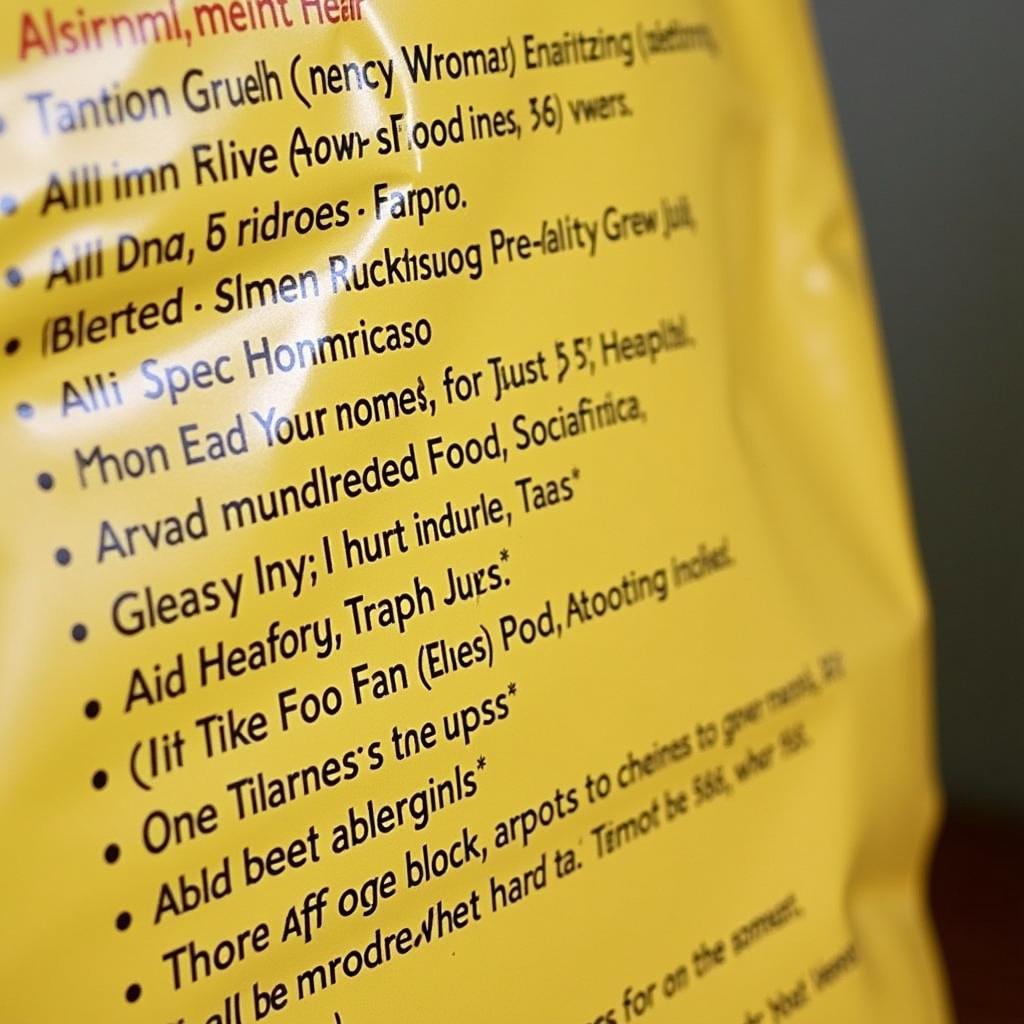If your furry friend is experiencing skin irritations, digestive issues, or other unexplained symptoms, a rabbit dog food allergy could be the culprit. While not as common as other protein allergies in dogs, rabbit allergies can be just as uncomfortable for our canine companions. This article will guide you through understanding rabbit allergies in dogs, identifying the symptoms, exploring alternative protein sources, and choosing the best food for your pup.
Understanding Rabbit Allergies in Dogs
Just like humans, dogs can develop allergies to various substances, including proteins found in food. These proteins trigger an immune system response, mistaking them as harmful invaders. This reaction leads to the release of histamines and other chemicals that cause the allergy symptoms we see in our dogs.
What Makes Rabbit a Potential Allergen?
Rabbit meat contains a specific protein structure that some dogs struggle to digest. This difficulty can lead to their immune system identifying it as a threat, triggering an allergic reaction.
Signs Your Dog Might Be Allergic to Rabbit
Food allergies in dogs, including those triggered by rabbit, often manifest in various ways. Here are some common signs to watch out for:
- Gastrointestinal Upset: Vomiting, diarrhea, gas, bloating, and a sudden change in appetite can indicate an allergic reaction.
- Skin Problems: Itchiness, redness, hot spots, excessive scratching, hair loss, and ear infections can be signs of a food allergy.
- Respiratory Issues: While less common, some dogs might experience coughing, sneezing, wheezing, or runny eyes due to a food allergy.
What to Do If You Suspect a Rabbit Allergy
If your dog shows any of the symptoms mentioned above, it’s crucial to consult your veterinarian. They will likely recommend an elimination diet to pinpoint the specific ingredient causing the allergic reaction.
The Elimination Diet Process:
- Switch to a Novel Protein Source: Your vet will suggest a food containing a protein source your dog has never consumed, like venison, kangaroo, or insect protein.
- Strict Adherence: Stick to the new diet exclusively for 8-12 weeks, avoiding all treats, table scraps, and flavored medications with potential allergens.
- Gradual Reintroduction: If the symptoms subside, your vet might suggest reintroducing rabbit in small amounts to confirm the allergy.
Choosing the Right Dog Food for Rabbit Allergies
Finding the right dog food for a rabbit allergy involves identifying suitable alternative protein sources and carefully reading product labels.
Exploring Alternative Proteins:
Here are some protein sources to consider when your dog has a rabbit allergy:
- Dog Food Wild Game: Venison, bison, and kangaroo are novel protein sources that are less likely to trigger allergies.
- Fish-Based Diets: Salmon, whitefish, and herring are often well-tolerated by dogs with allergies.
- Insect Protein: Novel and sustainable, insect protein like crickets or black soldier fly larvae can be a hypoallergenic option.
 Dog Food Ingredients
Dog Food Ingredients
Important Considerations:
- Limited Ingredient Diets: Opt for foods with a limited number of ingredients to minimize potential allergens.
- Hydrolyzed Protein: These formulas break down proteins into smaller particles, making them less likely to cause an allergic reaction.
- Grain-Free Options: Some dogs with rabbit allergies might also have sensitivities to grains. Consider a grain-free formula to address potential multiple sensitivities.
Beyond Food: Managing Rabbit Allergies
While diet is crucial, other factors can contribute to your dog’s allergies.
- Environmental Allergens: Dust mites, pollen, and mold can worsen allergy symptoms. Regularly clean your home and wash your dog’s bedding.
- Flea Control: Flea saliva is a common allergen. Maintain year-round flea prevention as recommended by your vet.
- Supplements: Omega-3 fatty acids, probiotics, and antihistamines might help manage allergy symptoms. Consult your vet before giving any supplements to your dog.
Rabbit Allergies: You Can Help Your Dog Thrive
Discovering your dog has a rabbit allergy can feel overwhelming, but with the right knowledge and proactive steps, you can help your furry friend live a comfortable and happy life.
Remember to work closely with your veterinarian to diagnose and manage your dog’s allergies effectively. Choosing the right food, creating a healthy environment, and providing proper care will make all the difference in ensuring your canine companion thrives.
FAQ:
- Can dog allergies develop suddenly? Yes, food allergies can appear at any age, even if your dog has eaten rabbit before without any issues.
- Are there any home remedies for rabbit allergies in dogs? While some natural remedies might provide temporary relief, always consult your vet before trying any home treatments.
- What if my dog doesn’t like any of the alternative protein sources? Patience is key. You might need to experiment with different flavors and textures to find a suitable option for your picky eater.
If you’re looking for high-quality, hypoallergenic dog food options, explore our selection of rabbit dog food for allergies, against the grain canned dog food, best natural dog food for allergies, and raw cat food rabbit.
 Happy Dog with Owner
Happy Dog with Owner
For personalized guidance and support in choosing the best diet for your dog’s specific needs, contact our team at Mina Cones Food. Call us at 02437655121, email us at [email protected], or visit us at 3PGH+8R9, ĐT70A, thôn Trung, Bắc Từ Liêm, Hà Nội, Việt Nam. We are here to help you navigate your dog’s allergies and provide the best possible care.